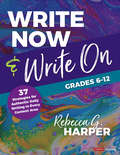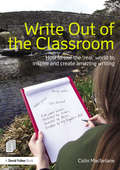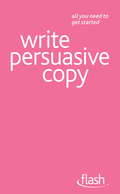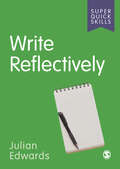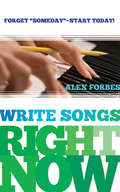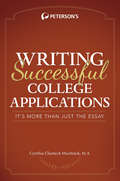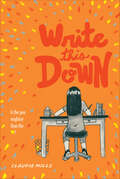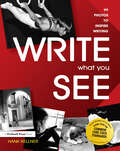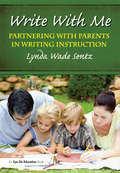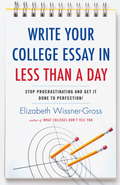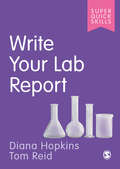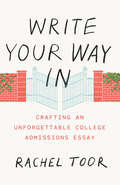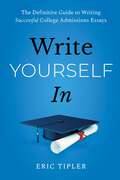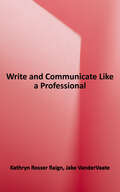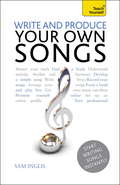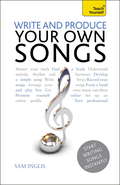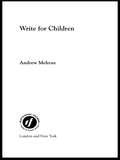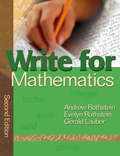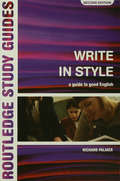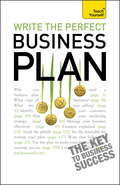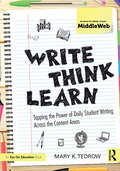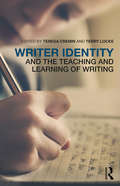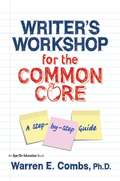- Table View
- List View
Write Now & Write On, Grades 6-12: 37 Strategies for Authentic Daily Writing in Every Content Area (Corwin Literacy)
by Rebecca G. HarperFrom social media to school success—take student writing to the next level! Your students may not realize it, but they’re already writers. All those informal text messages, Instagram captions, and Facebook posts have given them skills they can use as a springboard to the formal, content-specific writing they’ll need for success in school, college, and careers. The key, of course, is practice—plus a little guidance from you. And you’ll be ready, no matter what subject you teach, because this essential reference is packed with relevant, contemporary teaching strategies that are easily customizable to work across content areas. Inside, you’ll find: Engaging exercises based in the kinds of writing students already do Versatile "parachute writings"—quick bursts of practice to drop into a day’s lesson Strategies for introducing academic vocabulary and making it stick Skill-boosting strategies for successful summarizing and using textual evidence Variations specific to all disciplines and content areas Students should be writing daily, in all their classes, and they should be writing a lot, both inside and outside school. With this practical guide, you’ll be ready to help them up their writing game—and make literacy relevant, valuable, and authentic.
Write Out of the Classroom: How to use the 'real' world to inspire and create amazing writing
by Colin MacfarlaneWrite Out of the Classroom is a ground-breaking, highly practical book which provides teachers and creative writing tutors with great ways of tapping into the huge inspirational and educational potential of the richly diverse world beyond the classroom walls. Effective learning occurs when the process feels exciting, inspiring and ‘real’, and there is nothing more stimulating and ‘real’ than the real world itself. Working with groups in interesting and evocative settings can generate exceptional participant involvement. Well-led ‘locational brainstorming’ in such places increases vocabulary and produces an astonishing freshness of observation, ideas, language, plot and metaphor. Teachers commonly notice a quantum leap in writing quality arising from these sessions. Based on the author’s extensive experience in developing and leading out-of-classroom ‘intelligent observation’ and writing workshops, this unique book steers educators through the subtleties of guiding thoughtful data collection sessions in varied environments; selecting appropriate and motivational places and forms of writing, and running sessions linked to specific creative and factual writing tasks. The book covers the following areas and techniques and how they relate to out-of-classroom work: planning outings and choosing locations; leading language and ideas brainstorm sessions; descriptive poetry inspired by outdoor settings; ‘reflective haikus’, cinquains, and minimalist poetry; creating stunning plots and storylines; collective story writing; fictitious diary forms; descriptive travel writing; understanding poetry’s mechanics and sound patterns; assisting students with editing. This detailed, practical book also contains examples of remarkable student creative writing produced through these techniques, as well as photocopiable pages which include original examples of specific writing forms to model from, explanatory diagrams, helpful checklists and handy teachers’ ‘crib sheets’. Write out of the Classroom is the perfect ‘insider's guide’ to teaching and inspiring creative writing. It is an essential tool for classroom teachers in both Primary and Secondary schools, creative writing tutors, literacy co-ordinators and PGCE students, as well as leaders in residential centres and forest schools.
Write Persuasive Copy: Flash
by Jonathan GabayThe books in this bite-sized new series contain no complicated techniques or tricky materials, making them ideal for the busy, the time-pressured or the merely curious. Write Persuasive Copy helps you to write compelling copy, to show off your communication skills and fulfil your creative potential.
Write Reflectively (Super Quick Skills)
by Julian EdwardsYour step-by-step guide to reflective writing, this book gives you the practical skills to reflect on and learn from your experiences. With a clear framework that works for different situations and types of assignments, learn how to: · Take the time and space to reflect · Find a structure and writing style to communicate your experiences · Solve real-world problems · Set goals for future action Super Quick Skills provides the essential building blocks you need to succeed at university - fast. Packed with practical, positive advice on core academic and life skills, you’ll discover focused tips and strategies to use straight away. Whether it’s writing great essays, understanding referencing or managing your wellbeing, find out how to build good habits and progress your skills throughout your studies. Learn core skills quickly Apply them right away and see results Succeed in your studies and in life Super Quick Skills gives you the foundations you need to confidently navigate the ups and downs of university life.
Write Reflectively (Super Quick Skills)
by Julian EdwardsYour step-by-step guide to reflective writing, this book gives you the practical skills to reflect on and learn from your experiences. With a clear framework that works for different situations and types of assignments, learn how to: · Take the time and space to reflect · Find a structure and writing style to communicate your experiences · Solve real-world problems · Set goals for future action Super Quick Skills provides the essential building blocks you need to succeed at university - fast. Packed with practical, positive advice on core academic and life skills, you’ll discover focused tips and strategies to use straight away. Whether it’s writing great essays, understanding referencing or managing your wellbeing, find out how to build good habits and progress your skills throughout your studies. Learn core skills quickly Apply them right away and see results Succeed in your studies and in life Super Quick Skills gives you the foundations you need to confidently navigate the ups and downs of university life.
Write Songs Right Now
by Alex ForbesWrite Songs Right Now is a hands-on, step-by-step guide to creating original pop songs—an approach that has been road-tested by thousands of Alex’s students and coaching clients in New York City, some of whom have gone on to achieve great success. With insight, enthusiasm, and humor, Alex guides listeners through the process of brainstorming for ideas, crafting effective lyrics, and putting those lyrics to music. Whether you’ve written one song or one hundred, this audiobook will show you how to take your songwriting to new levels. Each chapter lays out the basics of a different element of songwriting, including song form, lyrics, melodies, chord construction, song dynamics, and the essential ingredients of a killer hook. There are lots of fun exercises to strengthen your songwriting muscles and increase your confidence. Alex also encourages up-and-coming writers to participate in songwriting communities locally and online, and makes a strong case for collaborating as a way to generate even better material.
Write Successful College Applications: It's More Than Just the Essay!
by Cynthia MuchnickToday's college admission applications involve writing more than just one essay. The various required paragraphs and statements demand skill and finesse. Writing Successful College Applications offers vital tips and step-by-step expert advice to help students create outstanding essays to succeed in all aspects of their college applications. This new book offers proven strategies to help students craft a successful essay or personal statement, with tips and insights to guide them through the writing process. There are over 50 sample personal statements from successful students plus bonus information on how to write strong activity and academic paragraphs as well as the "Why This School" paragraph-essential pieces of college applications that should not be overlooked. Interviews with Deans of Admission offer valuable information on what colleges are really looking for in an admission essay.
Write This Down
by Claudia MillsTwelve-year-old Autumn loves to write, and she can't wait to grow up and be a published author. She finds inspiration all around her, but especially in Cameron, the dreamy boy in her journalism class who she has a major crush on. When her older brother Hunter makes fun of one of her most personal poems—about Cameron—Autumn decides to prove that she is talented enough to become a published author. But when her essay about Hunter wins a contest, and her dream of being published is finally within reach, Autumn has to decide whether being a real writer is worth the cost of sharing her family's secrets and hurting people she loves. This touching story is sure to resonate with readers, and prove that the heart is mightier than the pen.A Margaret Ferguson Book
Write What You See: 99 Photos to Inspire Writing (Grades 7-12)
by Hank KellnerMotivate your students with the wide variety of photographs and writing prompts in this delightful book by award-winning photographer and former English teacher Hank Kellner.The varied prompts include key words, questions to consider, ideas for writing, possible opening lines, suggestions for research, and more. The book even comes with a CD so that you have the option of displaying the activities with an overhead projector.Write What You See contains a wealth of ideas for writing from the author as well as from real teachers across the country who have successfully used photography in the teaching of writing.Grades 7-12
Write With Me: Partnering With Parents in Writing Instruction
by Lynda SentzIn this book, teacher and author Lynda Wade Sentz presents innovative strategies for involving parents in their children’s writing instruction. Elementary school teachers can use these strategies to expand writing instruction into the home and enlist parents as “writing role models” who help to reinforce classroom learning. Designed for use in conjunction with your current writing program, these activities are engaging and enjoyable. They include the Partner Journal and the Partner Scrapbook, along with several others that enable parents and children to communicate via the written word.
Write Your College Essay In Less than A Day
by Elizabeth Wissner-GrossStrategies from a noted educational consultant on how to ease the pressure, ace the essay, and gain admission into your top-choice school Getting into college has become fiercely competitive, which makes the personal-essay part of the application process even more important–and stressful. But stop worrying! InWrite Your College Essay in Less Than a Day, Elizabeth Wissner-Gross–a top educational strategist in this area who counsels students at schools across the country–breaks down the harrowing ordeal of essay writing into manageable steps, leaving you with a fresh, polished, stand-out piece that admissions officers will love to read. Inside you’ll find • exercises to help you select an essay topic inspired by your most notable achievements–and winning a Nobel Prize needn’t be one of them • timed chapters (including snack breaks) to help you brainstorm, create, and critique your essay in only five hours • sample essays and grading criteria so that you can play the admissions officer–and know what you’re up against • advice on which writing techniques will score you points–and which could potentially sink your chances Accessible, savvy, and written with a student’s needs and concerns in mind,Write Your College Essay in Less Than a Daygives you all the tools you need to compose an original, professional essay that will help you turn your dream school into a well-deserved reality.
Write Your Lab Report (Super Quick Skills)
by Diana Hopkins Tom ReidLab reports are used across a range of subjects, and they require very different skills to writing essays or literature reviews. Get the know-how you need to avoid losing marks and write your report with ease. Understand the structure so you know what’s different before you start Avoid wasting time with insider tips on style and content Check your final report so you submit your best work. Super Quick Skills provides the essential building blocks you need to succeed at university - fast. Packed with practical, positive advice on core academic and life skills, you’ll discover focused tips and strategies to use straight away. Whether it’s writing great essays, understanding referencing or managing your wellbeing, find out how to build good habits and progress your skills throughout your studies. Learn core skills quickly Apply them right away and see results Succeed in your studies and in life Super Quick Skills gives you the foundations you need to confidently navigate the ups and downs of university life.
Write Your Lab Report (Super Quick Skills)
by Diana Hopkins Tom ReidLab reports are used across a range of subjects, and they require very different skills to writing essays or literature reviews. Get the know-how you need to avoid losing marks and write your report with ease. Understand the structure so you know what’s different before you start Avoid wasting time with insider tips on style and content Check your final report so you submit your best work. Super Quick Skills provides the essential building blocks you need to succeed at university - fast. Packed with practical, positive advice on core academic and life skills, you’ll discover focused tips and strategies to use straight away. Whether it’s writing great essays, understanding referencing or managing your wellbeing, find out how to build good habits and progress your skills throughout your studies. Learn core skills quickly Apply them right away and see results Succeed in your studies and in life Super Quick Skills gives you the foundations you need to confidently navigate the ups and downs of university life.
Write Your Way In: Crafting an Unforgettable College Admissions Essay (Chicago Guides to Writing, Editing, and Publishing)
by Rachel ToorWriting, for most of us, is bound up with anxiety. It’s even worse when it feels like your whole future—or at least where you’ll spend the next four years in college—is on the line. It’s easy to understand why so many high school seniors put off working on their applications until the last minute or end up with a generic and clichéd essay. The good news? You already have the “secret sauce” for crafting a compelling personal essay: your own experiences and your unique voice. The best essays rarely catalog how students have succeeded or achieved. Good writing shows the reader how you’ve struggled and describes mistakes you’ve made. Excellent essays express what you’re fired up about, illustrate how you think, and illuminate the ways you’ve grown. More than twenty million students apply to college every year; many of them look similar in terms of test scores, grades, courses taken, extracurricular activities. Admissions officers wade through piles of files. As an applicant, you need to think about what will interest an exhausted reader. What can you write that will make her argue to admit you instead of the thousands of other applicants? A good essay will be conversational and rich in vivid details, and it could only be written by one person—you. This book will help you figure out how to find and present the best in yourself. You’ll acquire some useful tools for writing well—and may even have fun—in the process.
Write Yourself In: The Definitive Guide to Writing Successful College Admissions Essays
by Eric TiplerWrite authentic, memorable college essays that will help you get into the right school for you with this guidebook from a veteran college admissions expert.Every spring, over one million high school juniors embark on an annual rite of passage: applying to college. And with college admission rates at an all-time low, getting into a competitive school is now tougher than ever. At the top schools, a strong transcript and great test scores will get your application noticed, but it&’s your essays, and the personal story that they highlight, that will get you admitted. But often, students don&’t know where to start. Teens fret over topics because they don&’t know what college admissions officers are looking for. They bend over backwards to write what they think colleges want to read, instead of telling their authentic story—which is what admissions officers actually want—in a way that will resonate with their readers. They also struggle because college essays, which are narrative, first-person, and introspective require a different set of skills from academic, expository writing they&’ve been learning for years in the classroom. Seasoned college admissions expert and educator Eric Tipler has seen this firsthand. Teens and their parents spend countless, anxiety-filled hours crafting and refining essays that are often lackluster. In Write Yourself In, Tipler meets students where they are, and provides comprehensive actionable advice in a warm and conversational tone. He demonstrates how to craft a winning essay, one that is authentic, vulnerable, and demonstrative of qualities like personal growth and emotional maturity. Instead of formulas, Write Yourself In gives students step-by-step processes for brainstorming, outlining, writing, and revising essays. It encourages them to seek out feedback at key points in the process, something Tipler has found to be vital to helping students produce their best writing. Further, the book includes sidebars that teach essential components of good storytelling, a &“secret weapon&” in the admissions process. In addition to the admissions essay, Write Yourself In also covers the most common supplemental essays on topics like community, diversity, openness to others&’ viewpoints, and why their school is a good fit for the student scholarship essays, as well as scholarship essays. Tipler includes sections that address current topics like the widespread use of ChatGPT and the discussion of race in the admissions essay, a facet of the student&’s application that will have newfound importance given the Supreme Court decision on affirmative action. Written with both the parent and teen in mind, Write Yourself In is the go-to handbook for writing a great college essay.
Write and Communicate Like a Professional
by Kathryn Rosser Raign Jake VanderVaateThis book is for the introductory technical writing student seeking to improve their writing and communication. The book covers how to improve professional style and tone, develop professional documents, work in teams, and plan and execute multiweek projects. It also includes various types of professional writing―such as letters, texts, handbooks, reports, agendas, press releases, and newsletters―while focusing on those communication forms used most often: emails, memos, and short reports. Authors Kathryn Raign and Jake VanderVaate also cover such important communication skills as collaborative writing in a chapter on sharing and giving feedback. With clear graphics, clever problem-solution rubrics, and the latest coverage of informal technical writing delivered through social media formats of email and text, Write and Communicate Like a Professional is essential reading for your professional success.
Write and Produce Your Own Songs: Audio eBook
by Sam InglisIs this the right book for me?This book is an essential companion for any aspiring songwriter, and is ideal for those with no formal musical education. Covering every genre of popular contemporary music, from rock and pop to musical theatre and country/western, it tracks everything from what harnessing your creative potential to finding a hook and selling, performing and promoting your songs. It also offers some material for those at a slightly more advanced level who'd like to understand things such as chords and sequencing. With straightforward notation and embedded audio which showcases the process at work, this accessible guide from a professional songwriter will prove indispensable for creating and peforming your own songs.Write and Produce Your Own Songs includes:Chapter 1: Tools of the tradeChapter 2: HooksChapter 3: Basic theoryChapter 4: Developing a hookChapter 5: Developing lyricsChapter 6: Song structureChapter 7: Arranging and recording your songsChapter 8: Playing live and forming a bandChapter 9: Promoting your music on the InternetChapter 10: The professional songwriteLearn effortlessly with a new easy-to-read page design and added features: Not got much time?One, five and ten-minute introductions to key principles to get you started.Author insightsLots of instant help with common problems and quick tips for success, based on the author's many years of experience.Test yourselfTests in the book and online to keep track of your progress.Extend your knowledgeExtra online articles to give you a richer understanding of the subject.Five things to rememberQuick refreshers to help you remember the key facts.Try thisInnovative exercises illustrate what you've learnt and how to use it.
Write and Produce Your Own Songs: Teach Yourself
by Sam InglisIs this the right book for me?This book is an essential companion for any aspiring songwriter, and is ideal for those with no formal musical education. Covering every genre of popular contemporary music, from rock and pop to musical theatre and country/western, it tracks everything from what harnessing your creative potential to finding a hook and selling, performing and promoting your songs. It also offers some material for those at a slightly more advanced level who'd like to understand things such as chords and sequencing. With straightforward notation and embedded audio which showcases the process at work, this accessible guide from a professional songwriter will prove indispensable for creating and peforming your own songs.Write and Produce Your Own Songs includes:Chapter 1: Tools of the tradeChapter 2: HooksChapter 3: Basic theoryChapter 4: Developing a hookChapter 5: Developing lyricsChapter 6: Song structureChapter 7: Arranging and recording your songsChapter 8: Playing live and forming a bandChapter 9: Promoting your music on the InternetChapter 10: The professional songwriteLearn effortlessly with a new easy-to-read page design and added features: Not got much time?One, five and ten-minute introductions to key principles to get you started.Author insightsLots of instant help with common problems and quick tips for success, based on the author's many years of experience.Test yourselfTests in the book and online to keep track of your progress.Extend your knowledgeExtra online articles to give you a richer understanding of the subject.Five things to rememberQuick refreshers to help you remember the key facts.Try thisInnovative exercises illustrate what you've learnt and how to use it.
Write for Children: Exploring Contemporary Issues In Writing For Children
by Andrew MelroseWriting for children is not about writing little stories, it is about writing big stories, shorter. Children's literature is an art form in its own right, and this book is for everyone who wants not just to write for children, but to write well for them. This short guide to creative writing for children is based on the author's own successful MA course. Andrew Melrose provides guidance on every aspect of the process of writing for children. He stresses the importance of 'writing for' the child and not 'writing to or at' them. Literacy and learning depend on writing and reading and it is therefore the responsibility of the writer to understand who they are writing for. The book is divided into four sections which cover all aspects of the writing process.This book goes far beyond the 'how to' format to help writers learn the finely balanced craft of writing for children. It will be an indispensable handbook for aspiring and practising children's authors.
Write for Mathematics
by Andrew S. Rothstein Evelyn B. Rothstein Gerald LauberAddressing NCTM standards, this second edition offers a wide range of practical writing strategies to help students deepen their understanding of mathematical concepts and theories.
Write in Style: A guide to good English
by Richard PalmerWrite in Style is aimed at all for whom clarity and accuracy of expression are important skills. All the main styles and grammaticalrules are covered, their sense axplained and vivid examples given of how not to write. Plenty of sound and meticulous advice is offered in a friendly and enthusiastic toneand a large part of the book covers specific types of writing, from essays and articles to minutes and reportage. The many illustrations, examples and exercises throughout help the reader put into practice the techniques and skillds the book explores.
Write the Perfect Business Plan: Teach Yourself (Ty Business Skills Ser.)
by Polly BirdBusinesses involved in preparing a business plan need guidance on what to present, and how to present it. This book is primarily aimed at new businesses and the self-employed, but it will also be useful to any business that has to raise a financial case during the course of their trading. Straightforward advice is given about what to consider and include in the plan, and how to present it.NOT GOT MUCH TIME?One, five and ten-minute introductions to key principles to get you started.AUTHOR INSIGHTSLots of instant help with common problems and quick tips for success, based on the author's many years of experience.TEST YOURSELFTests in the book and online to keep track of your progress.EXTEND YOUR KNOWLEDGEExtra online articles at www.teachyourself.com to give you a richer understanding of business planning.THINGS TO REMEMBERQuick refreshers to help you remember the key facts.TRY THISInnovative exercises illustrate what you've learnt and how to use it.
Write, Think, Learn: Tapping the Power of Daily Student Writing Across the Content Areas
by Mary K. TedrowFind out how to create the climate and space for everyday student writing. In this new co-publication with MiddleWeb, award-winning teacher Mary Tedrow shows you how to encourage students to integrate daily writing into their lives, leading to improved critical thinking skills, increased knowledge of subject areas, and greater confidence in written expression. This practical guide will help you consider the unique needs of your students, while still meeting state standards. You’ll discover how to… Develop classroom routines and activities that invite creativity and self-expression Teach writing methods that can be used across different grade levels and all content areas Challenge students to examine their own writing processes for thinking and problem solving Evaluate written work in a way that emphasizes growth over grades Many exercises, prompts, and attempts at thinking found in the book can be easily adapted for use both in and out of the classroom. Whether you are a new or experienced teacher, Write, Think, Learn will enable you to make writing come alive for all your students.
Writer Identity and the Teaching and Learning of Writing
by Teresa Cremin Terry LockeWriter Identity and the Teaching and Learning of Writing is a groundbreaking book which addresses what it really means to identify as a writer in educational contexts and the implications for writing pedagogy. It conceptualises writers’ identities, and draws upon empirical studies to explore their construction, enactment and performance. Focusing largely on teachers’ identities and practices as writers and the writer identities of primary and secondary students, it also encompasses the perspectives of professional writers and highlights promising new directions for research. With four interlinked sections, this book offers: Nuanced understandings of how writer identities are shaped and formed; Insights into how classroom practice changes when teachers position themselves as writers alongside their students; New understandings of what this positioning means for students’ identities as writers and writing pedagogy; and Illuminating case studies mapping young people's writing trajectories. With an international team of contributors, the book offers a global perspective on this vital topic, and makes a new and strongly theorised contribution to the field. Viewing writer identity as fluid and multifaceted, this book is important reading for practising teachers, student teachers, educational researchers and practitioners currently undertaking postgraduate studies. Contributors include: Teresa Cremin, Terry Locke, Sally Baker, Josephine Brady, Diane Collier, Nikolaj Elf, Ian Eyres, Theresa Lillis, Marilyn McKinney, Denise Morgan, Debra Myhill, Mary Ryan, Kristin Stang, Chris Street, Anne Whitney and Rebecca Woodard.
Writer's Workshop for the Common Core: A Step-by-Step Guide
by Warren CombsWriting instruction expert Warren Combs presents a step-by-step plan for teaching writing workshops that are aligned to the Common Core State Standards. The book is filled with practical mini-lessons, strategies, and tools for every stage of the writing process, from prewriting through publication. Scripting is provided, to show teachers how to model each strategy for students. In addition, Dr. Combs shows how teachers can use the following elements: The concepts Voice, Pictures, and Flow, to help students understand the essential elements of writing; The words Invite, Model, Write, Look, and Learn, to model effective writing for students and have them learn from your example; Revision strategies such as Jot and Blend, Combining Sentences, Writing Leads, and Writing Closes; Peer revision using Peer-Assisted Learning Systems (PALS); Student self-assessment rubrics. The book also includes scoring guides and pacing guides, to help teachers implement writing workshops more easily. As Dr. Combs demonstrates, you can give workshops more structure while still making writing come alive for your students.
